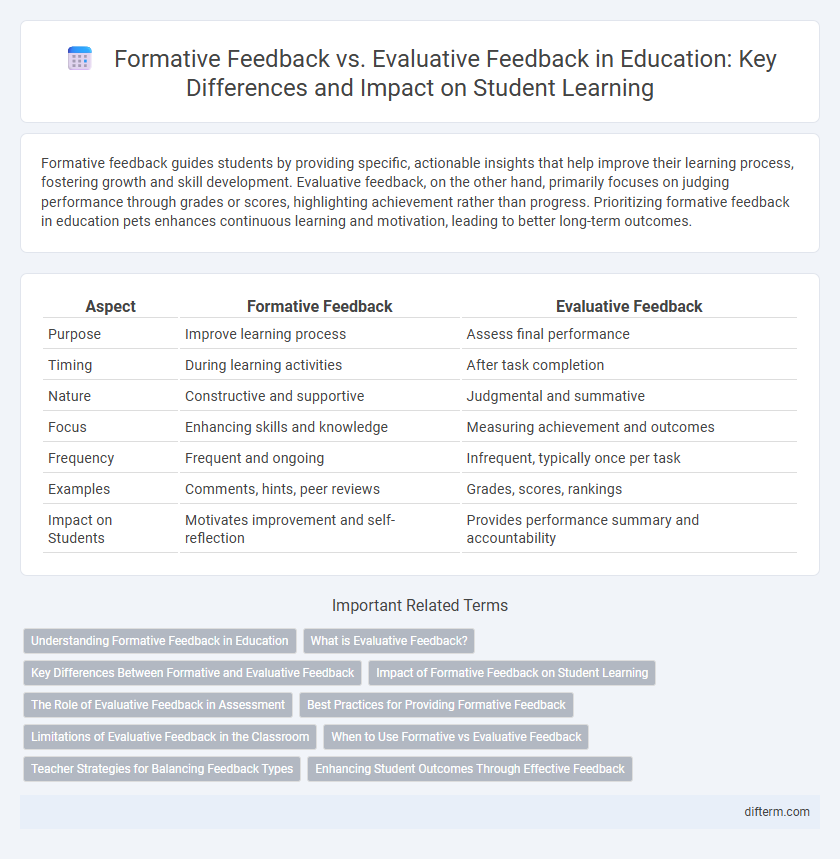Formative feedback guides students by providing specific, actionable insights that help improve their learning process, fostering growth and skill development. Evaluative feedback, on the other hand, primarily focuses on judging performance through grades or scores, highlighting achievement rather than progress. Prioritizing formative feedback in education pets enhances continuous learning and motivation, leading to better long-term outcomes.
Table of Comparison
| Aspect | Formative Feedback | Evaluative Feedback |
|---|---|---|
| Purpose | Improve learning process | Assess final performance |
| Timing | During learning activities | After task completion |
| Nature | Constructive and supportive | Judgmental and summative |
| Focus | Enhancing skills and knowledge | Measuring achievement and outcomes |
| Frequency | Frequent and ongoing | Infrequent, typically once per task |
| Examples | Comments, hints, peer reviews | Grades, scores, rankings |
| Impact on Students | Motivates improvement and self-reflection | Provides performance summary and accountability |
Understanding Formative Feedback in Education
Formative feedback in education involves providing specific, actionable insights that guide students' learning processes and promote skill development. Unlike evaluative feedback, which assesses overall performance for grading purposes, formative feedback emphasizes continuous improvement and helps identify areas for growth during instruction. This type of feedback enhances student engagement and supports deeper comprehension by fostering a collaborative learning environment.
What is Evaluative Feedback?
Evaluative feedback provides a judgment or score that measures a learner's performance against predefined criteria, often highlighting the level of achievement or proficiency attained. This type of feedback typically includes grades, rankings, or pass/fail indicators that summarize overall success rather than specific improvement areas. Evaluative feedback plays a crucial role in certification, accountability, and comparing learner outcomes across educational contexts.
Key Differences Between Formative and Evaluative Feedback
Formative feedback provides ongoing, specific guidance aimed at improving a learner's understanding and skills during the learning process, while evaluative feedback offers a summary judgment or grade reflecting overall performance after task completion. Formative feedback emphasizes growth and development through detailed, actionable suggestions, whereas evaluative feedback prioritizes measurement and accountability by comparing performance against set criteria. The key difference lies in formative feedback's role in facilitating continuous improvement versus evaluative feedback's purpose in assessing final achievement.
Impact of Formative Feedback on Student Learning
Formative feedback significantly enhances student learning by providing timely, specific guidance that helps learners identify their strengths and areas for improvement during the learning process. Unlike evaluative feedback, which summarizes performance for grading purposes, formative feedback promotes active engagement, self-regulation, and deeper understanding of subject matter. Research indicates that students receiving consistent formative feedback demonstrate higher achievement, increased motivation, and better skill retention across diverse educational settings.
The Role of Evaluative Feedback in Assessment
Evaluative feedback plays a crucial role in assessment by providing learners with specific judgments about their performance relative to established criteria, helping to determine the level of competence achieved. It guides teachers in making decisions about grading, progression, and areas needing improvement, thus ensuring accountability and consistency in educational standards. This type of feedback fosters self-awareness in students, enabling them to understand their strengths and weaknesses for future motivation and goal setting.
Best Practices for Providing Formative Feedback
Effective formative feedback emphasizes specific, actionable insights that guide student improvement rather than simply assigning a grade or judgement. Best practices include timely delivery, focusing on learning processes and strategies, and encouraging self-reflection to foster a growth mindset. Incorporating clear criteria and ongoing dialogue enhances student engagement and supports continuous learning progression.
Limitations of Evaluative Feedback in the Classroom
Evaluative feedback in the classroom often limits student growth by focusing solely on grades or scores, which can discourage risk-taking and creativity. It provides little guidance on how to improve specific skills or understanding, reducing opportunities for meaningful learning. This type of feedback may also increase student anxiety and diminish intrinsic motivation, hindering long-term academic development.
When to Use Formative vs Evaluative Feedback
Formative feedback is most effective during the learning process, helping students identify strengths and areas for improvement to guide ongoing development. Evaluative feedback is best suited after completing an assignment or assessment to measure achievement against specific criteria or standards. Educators should use formative feedback to promote growth and evaluative feedback to assign grades or summarize performance outcomes.
Teacher Strategies for Balancing Feedback Types
Teacher strategies for balancing formative and evaluative feedback include integrating regular, specific formative comments that guide student improvement while reserving evaluative feedback for summative assessments to measure mastery. Utilizing rubrics and clear learning objectives helps ensure feedback remains aligned with educational goals, promoting transparency and student engagement. Strategic timing and differentiation of feedback types enhance motivation and support diverse learning needs in classroom environments.
Enhancing Student Outcomes Through Effective Feedback
Formative feedback, designed to guide student learning by highlighting strengths and areas for improvement, significantly enhances student outcomes by promoting self-regulation and deeper understanding. In contrast, evaluative feedback, which primarily assigns grades or ranks, often limits student motivation and hinders growth-focused learning. Implementing consistent formative feedback strategies fosters a supportive learning environment that encourages continuous improvement and academic success.
formative feedback vs evaluative feedback Infographic

 difterm.com
difterm.com